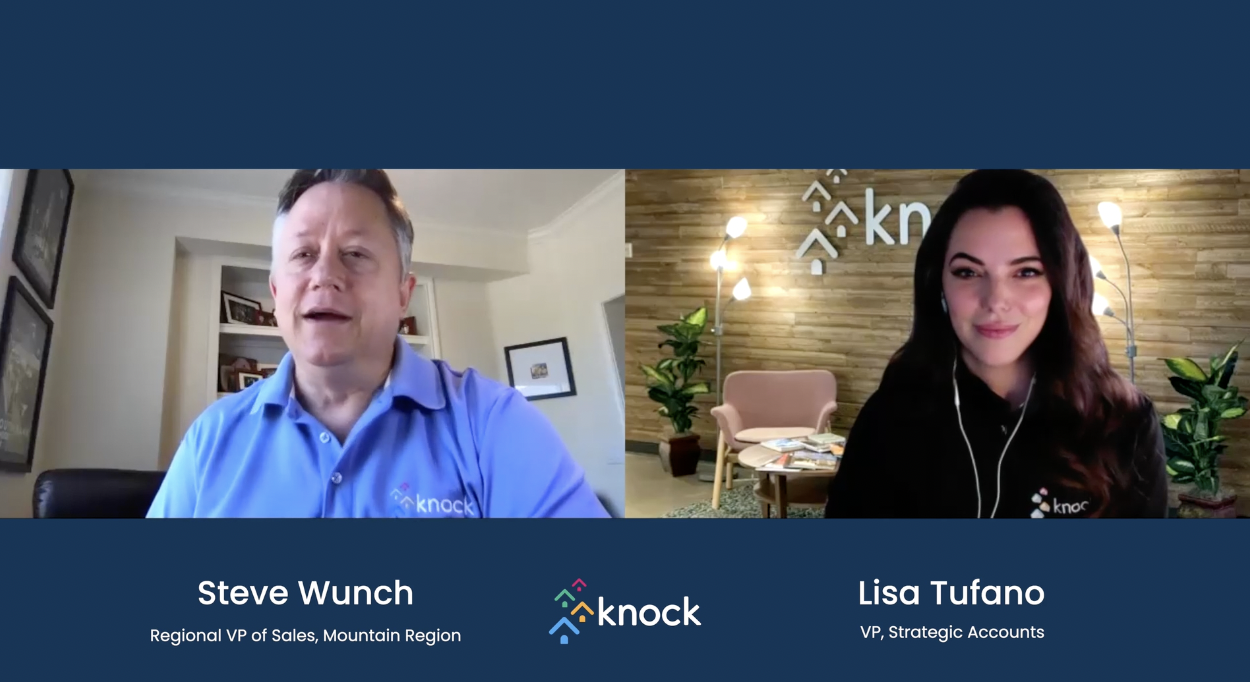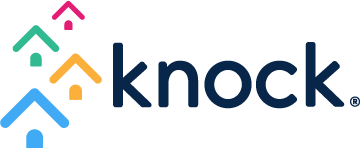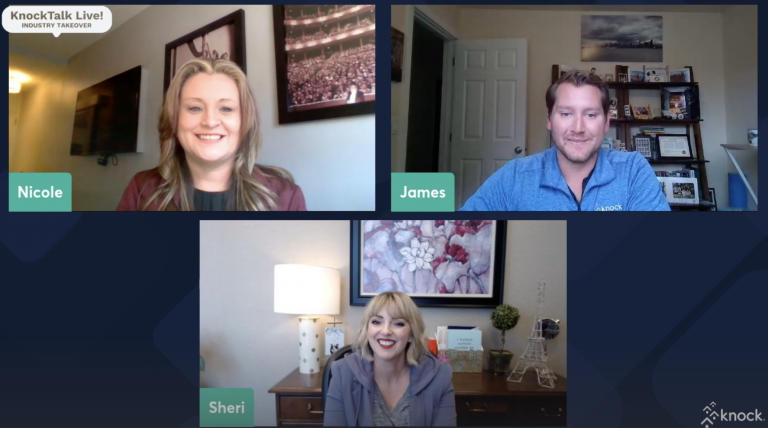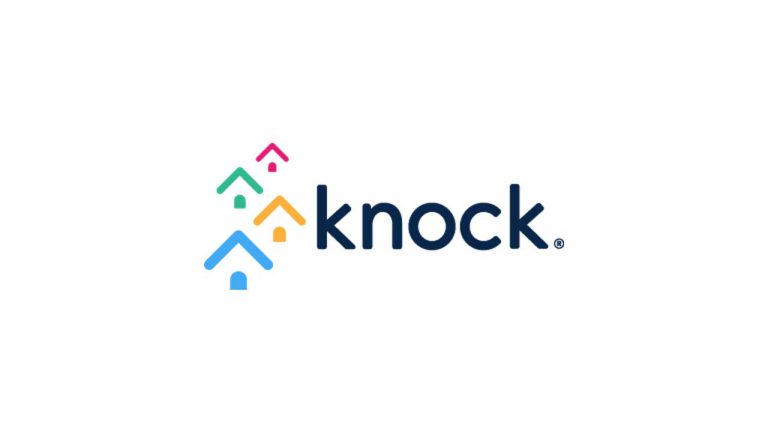Knock Talk: Ep. 12 – Really, though…how does multifamily technology drive NOI?

This week, our host Steve Wunch, regional vice president, sits down with Lisa Tufano, NOI strategist and Knock’s vice president of strategic accounts, to get into the nitty gritty about how, exactly, multifamily technology generates net operating income for Knock’s customers.
Watch the episode or read the transcript below.
Learn the value-based approach to evaluating multifamily technology.
Transcript
Steve: Welcome back to Knock Talk everybody, where we’re shedding light on all things front office tech.
In this episode, I’m extremely excited to introduce Lisa Tufano, Knock’s VP of strategic accounts and NOI strategist. She’s joining me today to talk about how multifamily tech drives NOI.
I’m so happy to have you with me here, Lisa. Welcome!
Lisa: Thank you Steve. It’s good to be here with you.
Steve: So, tell us. What does it mean to be an NOI strategist? I’m not sure that many in our audience will have those positions in their companies.
Lisa: Fair enough. You know, I pride myself on being someone very focused on optimizing revenue and finding dollars – and not ever leaving money on the table. Whether it’s professionally or in my personal life.
So, to that end, I love to strategize with our customers and partners about how we can ensure NOI is constantly optimized and make them more money.
Steve: That’s excellent. I’m sure your customers appreciate you’re a trusted advisor who has all that good knowledge like you do.
So, what I’d like to do, Lisa, to start things off is for you to give a high-level overview of Knock. Can you tell our listeners a 30,000-foot view of Knock-what it does?
Lisa: So anyone who is unfamiliar with Knock, we are the multifamily industry’s #1 CRM platform. We designed Knock to drive growth for NOI improvement on behalf of operators. Our intelligent front office solutions put meaningful customer engagement first, and then ensure that marketing, leasing, and operations teams have all the best tools and analytics to meet the needs of modern renters, and the needs of owners who are looking to maximize their NOI.
Steve: Ok. And in that strategic account role that you play at Knock, can you tell us what you see as being some of Knock’s best features that customers love the most?
Lisa: Absolutely. We definitely do offer a really comprehensive menu of tools and features that are redefining how leasing teams sell to the modern renter. And, that alone is impressive. But, I think we’ve become the leading CRM, because Knock is super fun and easy to use, and ultimately our customers love how much money we make for them.
Steve: That’s great. I love that. What would you say sets Knock apart from other multifamily CRMs that are out there in the marketplace now?
Lisa: Steve, I believe we have become the leading CRM, because Knock is easy and fun to use. And, we also provide more ongoing training and support than any of our competitors, and that makes a big difference in performance outcomes.
But, if I need to select one primary differentiator – it’s how much money we can make for our customers.
Steve: Let’s shift gears now and move our conversation toward addressing market challenges. What are you hearing or seeing that are specific challenges in the multifamily market and what our partners are currently facing?
Lisa: Boy, that’s a long list Steve. There’s a lot going on right now in the world. Let’s start with the market challenge. We’ve seen a lot of data coming out about this, but ultimately, vacancy is expected to peak in 2020 – we’re already seeing it in a lot of major metros. And, rents are expected to bottom out in the first quarter of 2021. So, that’s going to be interesting, and hopefully it ends up being not that bad. But, as everyone knows, our industry is nothing if not resilient – both from a performance and an operational standpoint. I think we’re going to be ok in the long term. But, there is certainly a lot of pressure on the market right now.
There’s definitely going to be budget challenges. You already see the conversations happening. I’m going to be on a panel soon to talk about ways we can allocate our dollars to be more strategic during a potential economic downturn.
Unfortunately, the COVID-19 pandemic struck during a really inopportune time for us. It happened right as we were entering the busy leasing season. It took everybody by surprise, and property managers were suddenly forced to start assessing costs, reallocate budgets and adopt new technology that would help to keep employees, prospects and current residents safe as we weather this together.
So, you know, a lot of this was thought to be a short term fix, or ‘just until things get back to normal.’ But, there may not be a ‘back to normal.’ I think we’re going to see a new normal. And all of this will lead to innovation and modernization as we approach sales in the multifamily industry. We’ve known for a long time that we needed to better address the needs and wants of modern consumers, but we’re going to have to accelerate those timelines and take a look at our techstacks to really see if they are able to stand the test of time, and carry us through 2021 as we address the persisting pandemic.
At this point, I think it’s time to move out of survival mentality and into thinking about things from a very deliberate and strategic framework when you’re thinking about technology and how you’re going to pay for it and what is valuable.
Steve: Great insight. A lot of the conversation around the forced technology – the decisions that were made for us have caused partners and operators out there to implement solutions for the short-term. But, to your point, this may be our new normal, so, do you think that some of the solutions, you know, that maybe Knock has brought to the table – or other partners in the tech community – in response to COVID, do you think they’re going to keep those things status quo in a post-COVID world? What’s your take on that?
Lisa: I certainly hope so. I think it’s long overdue. I’m excited to see the attention that now being paid to technology in general in our industry. People are always making self-deprecating comments about how multifamily is so slow to adopt new technology. And, again, this has been a very challenging time for everyone. But, I think one silver lining is that is has really given us an opportunity to peel back the layers of what we’ve got going on, and figure out – hopefully using really good data – what the best path forward is together. And that can only be good. That will continue to drive innovation. That will continue to improve the way we engage with renters and our existing residents, and deliver a better product overall as an industry for people who are trying to find a home.
Steve: Yeah. And, I think for years customers have been telling us, ‘This is how I want to shop. This is how I want to find a new home. Please, join me!’ And, finally we’re at the table, right?
Ok, so I want to segway into the whole conversation around NOI, because there is a whole lot of value for our listeners out there to understand how multifamily technology can really drive NOI, and have an influence in business results.
So, let’s talk about the tech in multifamily. What do you think customers are looking for or needing at the present time?
Lisa: I think customers are truly looking for technology that’s easy to use, first and foremost. That’s one of the things I’ve heard the most over the last three years being here at Knock. That’s a big gap, ease-of-use. I think the other big one is that there is a lack of confidence in the existing data that people have available through their technology today. They really want clean data that they can take action upon.
Everyone always talks about data, but not everyone feels comfortable or confident about the data they have today, so that’s going to be a big thing for people to focus on. I think that will drive a lot of buying decisions going into the new year.
You know, we don’t talk about it as much, but customer experience is also a big one – both for leasing teams as well as the renter. We just have to continue to innovate in a way that provides a really frictionless experience for our onsite teams who are the sales engine of this industry, and to the prospects and existing residents that they serve.
Steve: I can’t tell you how many conversations I’ve had when I was on the operations side about the truth in the data and how one report from one place says one thing, and the same report from someplace different says something different. And, it’s difficult because some of our audience are third party managers who are dealing with asset managers and owners who question the data and it puts them in an awkward position, so I completely hear that story.
And, I love the ease of use. I think from a customer experience or user experience perspective, I think that is really important to think about. How is this going to impact how the leasing team works? How easy they are to get a hold of and a response from? For the customer, do we meet them where they’re at and give them the options that they need very easily and simply, so there’s ease-of-use from a buying perspective as well?
Do you think there are any blind spots? A CRM platform handles a lot of stuff, but what are some of the blind spots there are out there?
Lisa: I have made some provocative comments on this before. I would say, there are definitely blind spots. Many operators are still catching up to the technology that’s available today. Even before the pandemic hit, we were behind. It’s more essential than ever to spend more time carefully onboarding new tools. But before you even onboard them, you’ve got to vet them. And, I think there is room for improvement there as well.
I think the temptation to go full-stack without even considering a best-in-class alternative … or even …
Steve: Or even, you know, settling for status quo… you know? Because you just don’t have the bandwidth to you know …
Lisa: Yeah, you articulated that really well. There’s a lot of really good reasons why there are blind spots today such as that. But, obviously, we can’t ignore it indefinitely. We’ve got to start driving meaningful value through technology. There’s just not a bull economy to support anything else. We’re all going to have to be a lot more reflective. Knock too. We’ve changed our roadmap, and shifted priorities based on what’s happened with the pandemic. And, I think we all need to be as fluid as possible given the circumstances.
But, for the buying decisions themselves, I think the most important thing that someone can do is ask themselves, ‘How is this going to affect my bottom line and NOI?’ That’s any buying decision – especially a technology decision. Is it going to drop down my cost-per-lead? Is it going to improve my leasing team performance and conversion rates? Will it increase our team efficiency? And, can it replace other tools from our budget sheet?
Looking at technology, those are all important questions to be asking yourself. And, we should be asking those questions even as we’re looking at our existing tech and full stack platforms too. Everything needs to have a second glance at this point.
Steve: I like that you used the word ‘reflective’ instead of ‘reactive’. There’s a big difference between the two.
Lisa: Yeah. These are important decisions that have huge downstream impacts on a lot of areas of our business whether it’s marketing, sales, operations, etc. We live in an age where anything can be built with technology. Sorry – any problem can be solved by building software. But, you really have to identify what problems you’re trying to solve, and what your true goals are. And then, you need to ensure the technology you’re buying and stacking together aligns with those goals.
So, you know, whatever that might look like for you, you just need to make sure you’re adopting technology that is focused on driving your NOI and other goals during the pandemic and beyond.
Steve: So, you mention driving NOI and increasing productivity. How does productivity actually translate into net operating income? Give us some ideas around what does that look like? You know, because there might be folks in our audience who are asking the questions, but may not understand where the big wins are from an NOI perspective. So, what are your thoughts?
Lisa: That’s a good question. If we’re looking at how productivity can specifically translate into NOI, it’s important to find solutions that can complete tasks on your behalf. For example, a solution that can prequalify your traffic, that can identify or fast track your hottest leads to a tour – without ever having to interface with a leasing agent or a call center.
It’s really really critical to get automation right. There’s a lot of automation available in the marketplace. We’ve brought a lot of it to market ourselves. And, you should take advantage of that automation, so you can free up time for your leasing team to address existing residents or so they have time to build trust and nurture prospects who may require a little extra hand holding in the buying process.
I would say that Knock’s automation in particular can do a lot of the heavy lifting in terms of traditional sales engagement. And, as a result, it ends up speeding up the sales journey for both prospects and residents. And, I mention residents because a lot of CRM technology out there doesn’t really address resident renewals and retention in a meaningful way. And, we do, because we recognize over half of an operator’s revenue comes from renewals. So, that’s a pretty critical area to optimize.
Steve: I love that you focus on automation in a way that it’s not scary. I know some folks think automation means there doesn’t need to be a leasing consultant anymore – but that’s not true. There does. But, what automation does is give them the time they need to do things that matter to other pieces of the business vs. just the prospecting piece.
Can you give us a few examples that you’ve seen where technology has had a big impact on NOI?
Lisa: Regardless of industry, technology can mitigate market, people, process and legal risk. It also creates more resilient assets by driving operational efficiency. Or it should – that’s the whole point.
I think good technology should ultimately help your managers make the data-driven decisions to ensure you’re getting the most out of your NOI and out of your communities.
I think, in terms of operational efficiency, that often takes the form of increased leasing team productivity, and can be a major factor in driving NOI.
Steve: You know, I also thought about the marketing spend. And having a handle on where your marketing dollars are going. And, if you’re not getting the return on investment that you need from those sources, you have to have a trusted advisor who can say these are the ones that are working for you, and these are the ones that are not. So, where can we reallocate funds to different channels that give you a better return.
Lisa: That’s so true, and there are some really great marketing consultants out there in the industry who you can hire that can help out with that. But, if you don’t have the extra budget for that, then just being able to rely on your CRM stack would be a good alternative.
When we look at things like the NOI that Knock delivers, one of the big metrics we focus on improving for our customers is their conversion. And by that I just mean, what we typically see in our data is that when a customer who came from a different CRM switches to Knock, they’re typically seeing about a 20% improvement in their lead to lease conversion within their first 12 months on the Knock platform.
So, being able to measure where you are today and where you’d like to be, and whether you partner with Knock or not, being able to really drill down and understand those metrics are critical to your success long term.
I can’t stress enough the importance of shopping around, and being very through and thoughtful during the process.
Steve: You touched on a lot of different aspects, and it’s not just the data, it’s about giving a property manager the knowledge they need about performance. So, when they get on a call with an owner, they can speak to the business, and they’re not taken by surprise. I think that is a huge win.
Well, gosh Lisa this has been such a great conversation. I really appreciate your insight. You’re very thoughtful in your approach to being that trusted advisor for your customers, and I think our listeners can really appreciate that. To wrap things up, I just want to hear from you about what you think multifamily should be excited about when it comes to the future of technology?
Lisa: So, when the pandemic first broke, we weren’t really sure how quickly the industry would be able to adapt. And, historically, we’ve been slow to adapt new technology. But, from what I’ve seen, everyone is super fired up, and very engaged about working together, and having all the conversations that are needed for the multifamily space to weather this successfully together.
The cool thing here at Knock is that we have over 30 engineers and data scientists who are dedicated to leading the charge in front office invention and technology. So, we’re ready to rock and roll. We feel like we were built for this moment, and we just want to help in anyway we can – whether it’s helping you grow your business or making life easier while maintaining business continuity for your onsite teams who are going through a lot right now. I’m most excited about the tipping point we’ve hit as an industry where these conversations are finally happening, and I think it’s going to be awesome for us long term. We’re all going to grow together.
Steve: That’s awesome. I love it. Thanks so much for your perspective, and I’ve enjoyed spending this time with you. I will see you all on our next Knock Talk.


